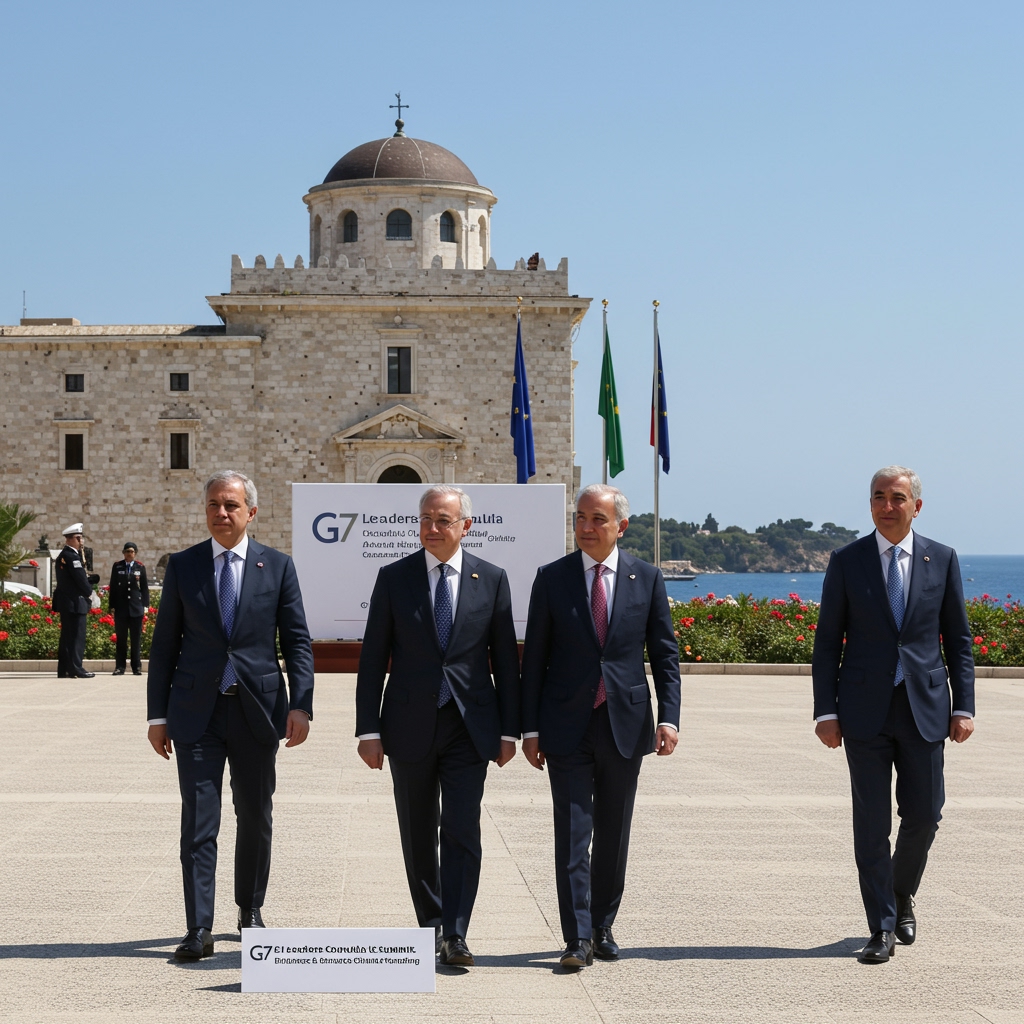G7 Leaders Conclude Apulia Summit with Comprehensive Global Agenda
Apulia, Italy – Leaders from the Group of Seven (G7) nations concluded their annual summit today in the scenic region of Apulia, Italy, culminating in the issuance of a robust joint communiqué. The high-stakes gathering saw the heads of state and government from Canada, France, Germany, Italy, Japan, the United Kingdom, and the United States, along with representatives from the European Union, convene to address some of the world’s most pressing challenges. The resulting statement underscores a united front on critical global issues, ranging from economic stability and climate action to the governance of emerging technologies and future health security.
The summit, held against a backdrop of complex global dynamics, including geopolitical tensions, economic shifts, and the persistent impacts of climate change, served as a crucial platform for the world’s leading industrialized democracies to coordinate their responses. The joint communiqué is more than just a summary of discussions; it is a roadmap outlining specific areas where the G7 nations pledge to enhance collaboration and commitment.
Bolstering Global Economic Stability
A central theme of the discussions and a cornerstone of the final communiqué was the commitment to bolstering global economic stability.
The leaders acknowledged the ongoing uncertainties impacting the international economic landscape. These uncertainties stem from various factors, including fluctuating inflation rates, supply chain vulnerabilities exposed in recent years, and the economic repercussions of international conflicts. In response, the G7 nations emphasized the importance of coordinated efforts to navigate these challenges. The communiqué highlighted the need for sound macroeconomic policies, structural reforms to boost long-term growth potential, and measures to ensure the resilience of financial systems. Discussions delved into strategies to manage debt vulnerabilities, particularly in developing economies, and the importance of open, rules-based trade as a driver of global prosperity.
Ambitious Climate Targets and Funding Mechanisms
Climate change remained a top priority, with the G7 leaders reaffirming their commitment to achieving ambitious climate targets. The summit outlined new commitments aimed at accelerating the transition to clean energy and reducing greenhouse gas emissions.
A significant focus of the climate discussions was the imperative of supporting developing nations in their own transitions. The communiqué explicitly included the commitment to increasing funding mechanisms for developing nations. This acknowledges the principle of common but differentiated responsibilities and the need for financial and technological support to enable these countries to invest in renewable energy, adapt to the impacts of climate change, and build resilience. The leaders discussed various avenues for mobilizing climate finance, including leveraging multilateral development banks, encouraging private sector investment, and exploring innovative financial instruments. The emphasis was on ensuring that climate action is equitable and does not exacerbate existing global inequalities.
Addressing Supply Chain Resilience and Future Challenges
Beyond the core economic and climate agenda, discussions at the Apulia summit reportedly focused on several other critical areas vital for future global stability and prosperity.
Supply chain resilience was a key topic, building on lessons learned from recent global disruptions that highlighted dependencies and vulnerabilities. Leaders discussed strategies to diversify supply chains, invest in critical infrastructure, and enhance international cooperation to prevent future bottlenecks and ensure the reliable flow of essential goods and materials, from medical supplies to critical minerals and advanced technology components.
The rapid evolution of artificial intelligence (AI) also featured prominently, leading to discussions on artificial intelligence governance. The leaders recognized both the immense potential of AI for economic growth and societal progress and the inherent risks related to ethics, security, bias, and jobs. They agreed on the need for international cooperation to develop shared principles and frameworks for AI development and deployment that are safe, secure, and trustworthy, while fostering innovation.
The recent global health challenges underscored the necessity of enhancing global health security. The G7 leaders addressed collaborative strategies for pandemic preparedness following recent global health challenges. This involved discussions on strengthening global health systems, improving surveillance and early warning mechanisms, accelerating vaccine and therapeutic development and distribution, and ensuring equitable access to medical countermeasures during future health crises.
Commitment to Multilateralism and Implementation
A foundational principle threading through all discussions was the reaffirmation of the commitment to multilateralism.
The leaders stressed the indispensable role of international cooperation and institutions in tackling global challenges that no single nation can effectively address alone. They pledged to strengthen the rules-based international order and work through multilateral forums to achieve their shared objectives. The summit served as a powerful demonstration of this commitment, bringing together leaders not just from the G7 but also engaging with leaders from other countries and international organizations to broaden consensus and collective action.
Crucially, the G7 leaders agreed to task their finance and environment ministers with the responsibility of developing specific implementation plans. These plans are intended to translate the broad commitments outlined in the joint communiqué into concrete actions and deliverables. The ministers are expected to work collaboratively and present these detailed plans by year-end, providing a clear timeline and accountability mechanism for the initiatives launched at the Apulia summit. This step signals a determination to move from declarations of intent to tangible progress on the ground across the diverse range of issues discussed.





